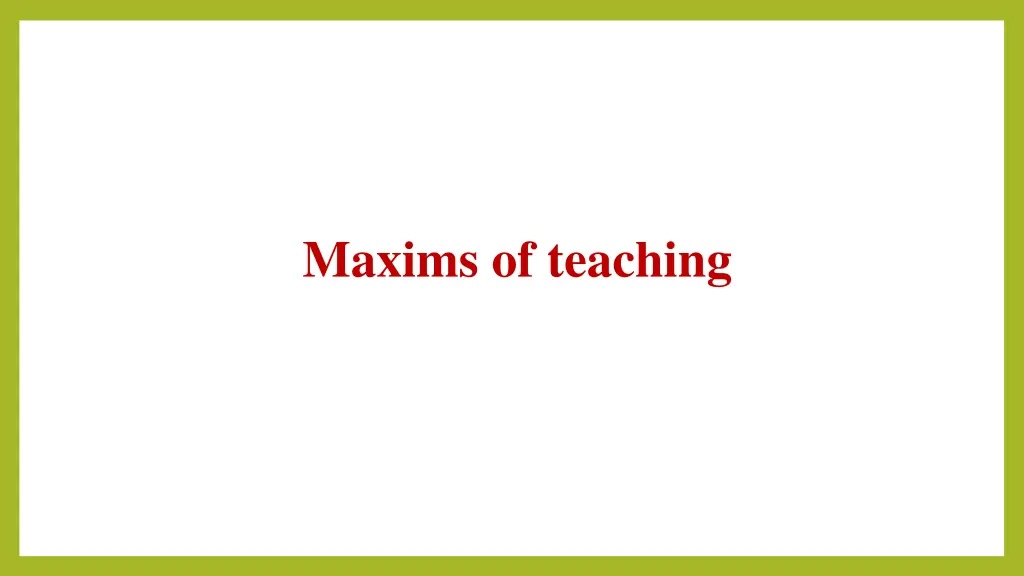
Effective Teaching Strategies for Educational Success
Explore the key maxims of teaching, guiding educators from known to unknown, simple to complex, concrete to abstract, and more. Enhance your teaching methodology with valuable insights for student comprehension and retention.
Download Presentation

Please find below an Image/Link to download the presentation.
The content on the website is provided AS IS for your information and personal use only. It may not be sold, licensed, or shared on other websites without obtaining consent from the author. If you encounter any issues during the download, it is possible that the publisher has removed the file from their server.
You are allowed to download the files provided on this website for personal or commercial use, subject to the condition that they are used lawfully. All files are the property of their respective owners.
The content on the website is provided AS IS for your information and personal use only. It may not be sold, licensed, or shared on other websites without obtaining consent from the author.
E N D
Presentation Transcript
What is Maxims of teaching ? Maxims are short statement like a dictum It is a general rule of conduct Maxims of teaching means general rule of teaching Maxims are guidelines which help the teacher to act accordingly during the teaching process.
Maxims of teaching Maxims of teaching From Known to Unknown From Induction to Deduction From Simple to Complex From Empirical to Rational From Concrete to Abstract From Analysis to Synthesis From Particular to General From Whole to Part From Psychological to Logical
From Known to Unknown ( ) Knowledge must be given by linking it to previous knowledge Known is trustworthy and unknown cannot be trusted so while teaching we should proceed known and go towards unknown. Example - Buying and Selling (Known) Profit and Loss (Unknown)
From Simple to Complex ( ) Simple concepts are taught first to the students and the complex ideas and concept later. Easy concepts are introduced first and difficulty level to be increased gradually Example Culture (Simple) Socio-Cultural Process (Complex) Addition (Simple) Subtraction (Complex)
From Concrete to Abstract ( ) Concrete things are solid and they can be visualized and verified by five senses. But abstract things are only imaginative things and can t be seen or touched directly. In general, tangible entitles are concrete objects while intangible entitles are abstract objects. Based on cognitive development of the students Example * Water Bodies (Concrete ) Ocean Currents (Abstract) * Counting with Abacus (Concrete) BODMAS (Abstract)
From Particular to General ( ) From particular statement, specific concept or subject matter to more generalized principles Example Experiment (Particular) Implication (General) Reference to Context (Particular) Moral of the story (General)
From Whole to Part ( ) The teacher must introduce the student to the whole lesson first and then move on to the part of it. The student should be acquainted with complete lesson, chapter, concept, theory or idea first and then breakdown different elements for discussion. Example Prose (Whole) explanation of every paragraph (Part)
From Psychological to Logical ( ) Basic principles of psychology like student s interest, aptitude, creativity, attitude and development level etc. to kept in mind for selection of subject matter and then later to logical arrangement of the content. This maxim states that the sequence of teaching process should be psychological followed by logical. Example Incorporation of subject matter of students interest (Psychological) Completing the lesson with systematic work (Logical)
From Inductive to Deductive ( ) In inductive approach we start from particular examples and establish a general rules. In deductive approach we assume a definition, a general rules or formula and apply it to particular example. Example
From Empirical to Rational ( ) Empirical knowledge is based on verifiable observable experiences. It is based on result and observations. Rational knowledge is based on reasons and logic. Only reasoning and reflections can be used as evidence to prove. Example Rules and Norms (Empirical) Value and Ethics (Rational) Environmental Pollution (Empirical) future implications of pollution (Rational)
From Analysis to Synthesis ( ) Analysis is the process of breaking down an idea, concept, or phenomenon into its basic parts for better understanding. Synthesis is compounding of various ideas, concept or phenomenon into one whole. Example Planning, Teaching, Feedback, Re-planning, Re-teach, Re-feedback (Analysis) Micro-teaching Cycle (Synthesis)
